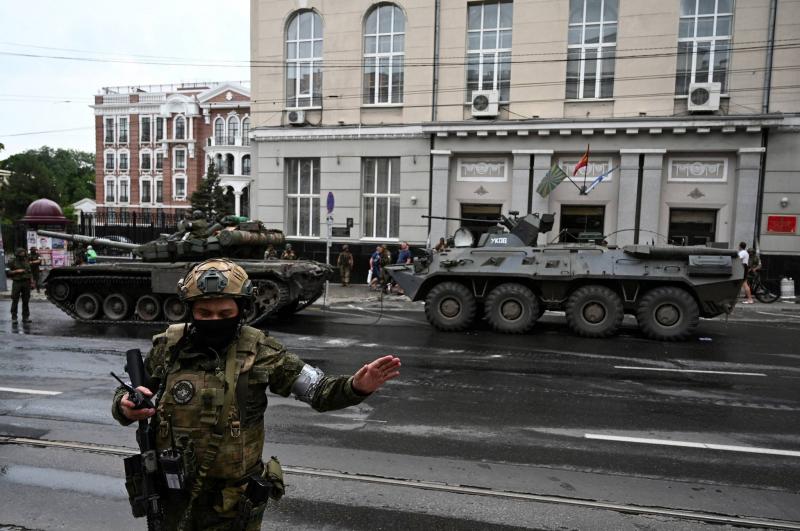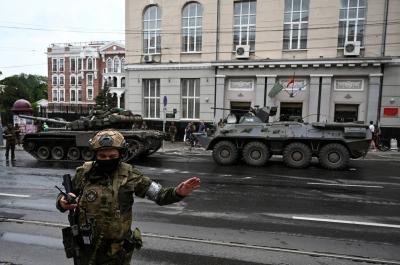The recent mutiny of the Russian private military group Wagner has raised questions about the fate of the extensive military and commercial operations of the group in regions across Europe, the Middle East, and Africa.
Here are some facts about Wagner and its operational areas:
**Ukraine**
Wagner deployed in Ukraine shortly after the invasion began early last year. By summer, the private military group had recruited thousands of prisoners to fight on the front lines. By December, while playing a key role in the Battle of Bakhmut, U.S. intelligence reported that the group had 40,000 recruited prisoners fighting in Ukraine, though Wagner itself did not comment on this figure. The group's leaders took credit for Russian successes in Bakhmut and criticized the regular Russian army and the leadership of the Russian Defense Ministry.
**Belarus**
Yevgeny Prigozhin, the head of Wagner, arrived in Belarus on Tuesday under an agreement negotiated by its president, Alexander Lukashenko. Russian President Vladimir Putin indicated that members of the group would be offered an option to move there. Satellite images of a military base near Asipovichy, southeast of Minsk, suggest rapid development for a facility intended for Wagner.
**Syria**
Russia officially began military operations in Syria in 2015 to support President Bashar al-Assad and deployed its air force from Khmeimim Air Base, using contractors including Wagner for some ground operations and security roles. U.S. forces killed several hundred Wagner fighters during a confrontation in Syria in 2018. The group took on the task of providing security for the Shaer oil field, and Western officials reported that Wagner owns the Afro Polis company, receiving 25% of profits from several oil fields. Wagner recruited former fighters from the Syrian armed opposition in areas regained by Assad to use them as mercenaries in places including Libya since 2019. Khmeimim Air Base became an important logistics hub for Wagner, serving as a transit point for flights between Russia, the Middle East, and Africa through airbases in Libya.
**Libya**
Wagner entered Libya in 2019 to assist Libyan military commander Khalifa Haftar in his attack on Tripoli to oust the internationally recognized government. UN sanctions monitors noted in 2020 that Wagner had deployed around 1,200 personnel in Libya, and U.S. Africa Command reported that Russian military aircraft were supplying Wagner fighters there. Wagner operated air defense systems and fighter jets from Al Jufra Air Base south of Tripoli, with some warplanes arriving from Khmeimim. In addition to recruiting Syrians, Wagner also worked with foreign fighters from Sudan, Chad, and elsewhere. Although Haftar's offensive ultimately failed and a ceasefire was achieved in 2020, Wagner did not leave Libya and remains active in Jufra and other airbases in the south and east, which researchers say they use as launch points to other locations in Africa. Additionally, they have operated near major oil fields and have commercial interests in Libya, including energy production and local smuggling networks.
**Central African Republic**
The Central African Republic is one of the poorest countries in the world despite its mineral wealth. Russian mercenaries, including Wagner personnel, intervened in 2018 alongside the government to quell a civil war ongoing since 2012. The Russian ambassador to the Central African Republic stated in a February interview with state-owned Russian media that 1,890 "Russian trainers" were in the country. Analysts suggest that Wagner has obtained logging rights and control of a gold mine in the republic. This week, the United States imposed sanctions on a company in the Central African Republic among others, which included one from the Emirates, alleging that these companies are involved in financing Wagner through illicit gold transactions.
**Mali**
Russia and Mali assert that Russian fighters there are not mercenaries but trainers assisting local forces in combating Islamist militants who have waged an insurgency for ten years. Malian leaders seized power in a coup in 2021 and called in Wagner after requesting the departure of a French military mission. In 2021, Reuters reported that the government directly contracted Wagner, paying approximately $10.8 million per month for its services. Wagner fighters have been accused of involvement in a 2022 incident in Moura, central Mali, where local forces and Russian fighters allegedly killed hundreds of civilians.
**Sudan**
Western diplomats and governments claim that Wagner is involved in gold mining, spreading misinformation, and orchestrating schemes to suppress pro-democracy protests in Sudan while Russia seeks to influence events before and after the ousting of Omar al-Bashir in 2019. Moscow has ties to both sides of a conflict that erupted on April 15 in Sudan, but Wagner is believed to maintain connections with the Rapid Support Forces rather than the army. Wagner has denied operating in Sudan, stating that its members have not been present there for over two years and have no role in the fighting. However, the United States accused Wagner in May of supplying the Rapid Support Forces with surface-to-air missiles, "contributing to the prolongation of an armed conflict that only leads to more chaos in the region."




